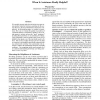Free Online Productivity Tools
i2Speak
i2Symbol
i2OCR
iTex2Img
iWeb2Print
iWeb2Shot
i2Type
iPdf2Split
iPdf2Merge
i2Bopomofo
i2Arabic
i2Style
i2Image
i2PDF
iLatex2Rtf
Sci2ools
118
click to vote
ICIA
2007
2007
When Is Assistance Really Helpful?
We regularly operate under the notion that one agent assists another when the first does something for the second. However, the story behind this is much more complicated. In this position paper, we explore two questions: How can we evaluate the quality or goodness of a particular instance of assistance? and How can we design agents to initiate and provide “good” assistance? In asking these questions, we are assuming two things. First, performing a task for another agent is not always helpful to that agent even if the task really needs to be done. But second, a helper that does not have the skill or resources to accomplish a specifically requested task may still provide real help. Our experimental work attempts to address the fundamental elements of helpful assistance. One surprising initial result reminds us of an common understanding about help: providing assistance is a two-way street. Measuring the Helpfulness of Assistance. Providing assistance can be one of those activitie...
Related Content
| Added | 02 Oct 2010 |
| Updated | 02 Oct 2010 |
| Type | Conference |
| Year | 2007 |
| Where | ICIA |
| Authors | Wayne Iba |
Comments (0)

